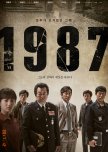Excessively over-dramatized
1987: When the Day Comes directed by Jang Joon-hwan and written by Kim Kyung-chan is a well - meaning fictional attempt to tell the story of events leading up to the real life 1987 June Democratic Uprising in Korea. This was triggered by the death of a student protester during police interrogation which the authorities conspire to cover up. The movie starts well when focusing on the actions of the honest medical examiner and prosecutor who both are disinclined to look the other way and authorise a fake mock-up of the cause of death to cardiac arrest.
However the story line flow falters when the narrative spreads outwards to include the perspectives of police, both good and bad, journalists trying to ascertain the facts of the case, other university students, prison guards, catholic priests, people on the street and established political authorities. There simply are too many characters involved on which to concentrate one's attention. Director Kim would have been well - advised to just focus on a few key personalities instead of casting his net so far and wide, albeit with the worthy aim of reflecting the general population's demand for democratic reform.
The movie is successful though at depicting the fact that South Korea, barely a year before the 1988 Seoul Olympics was for all intensive purposes, a dictatorship, something many modern Westerners may fail to realise, aware only of the vibrant democracy that is the current Sixth Republic of South Korea. In a long roundabout fashion, 1987 does manage to reflect its genesis.
However the story line flow falters when the narrative spreads outwards to include the perspectives of police, both good and bad, journalists trying to ascertain the facts of the case, other university students, prison guards, catholic priests, people on the street and established political authorities. There simply are too many characters involved on which to concentrate one's attention. Director Kim would have been well - advised to just focus on a few key personalities instead of casting his net so far and wide, albeit with the worthy aim of reflecting the general population's demand for democratic reform.
The movie is successful though at depicting the fact that South Korea, barely a year before the 1988 Seoul Olympics was for all intensive purposes, a dictatorship, something many modern Westerners may fail to realise, aware only of the vibrant democracy that is the current Sixth Republic of South Korea. In a long roundabout fashion, 1987 does manage to reflect its genesis.
Was this review helpful to you?











